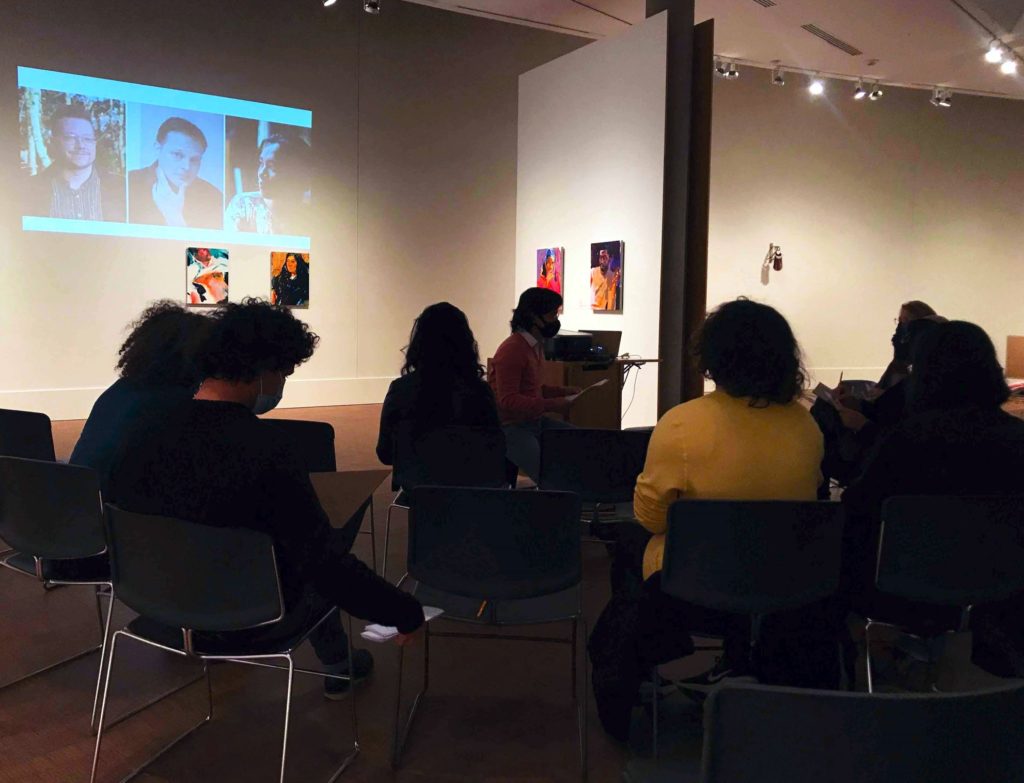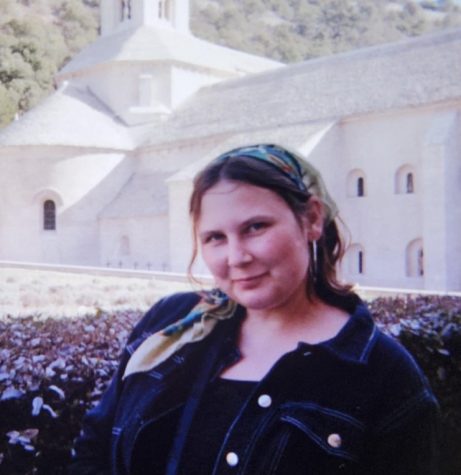Surrounded by artwork from the “Queer/Dialogue” exhibit, a dozen members of the college community, including students and faculty, gathered to explore the connections between art and literature last Tuesday.
The writing workshop, titled “How to Write a Queer Story,” was led by Santiago Sanchez, Grinnell College Mellon Fellow in fiction. The event took place on Tuesday, Oct. 26 in the Museum of Art. It began with Sanchez reading aloud three short pieces of fiction by queer authors, each work picked by Sanchez for its resonance with a specific work of art in the “Queer/Dialogue” exhibit.
When asked why they chose to lead this workshop, Sanchez said, “I think the main impulse came from wanting to think about what queer traditions, or what queer modes of storytelling were shared between these two different types of art forms.”
The first written work Sanchez chose was “The Frog King” by Garth Greenwell, who taught in Grinnell’s English department during the 2020-21 year. Sanchez read the piece in front of the painting “Lovers” by Doron Langberg. This was followed by “In Kind” by Callum Angus, read alongside the “Swatched Pot/Potted Swatch” sculptures by Jeremy Laing. Finally, “The Lesson of the Bees,” a chapter from Kai Cheng Thom’s book “Fierce Femmes and Notorious Liars: A Dangerous Trans Girl’s Confabulous Memoir,” was read alongside Devan Shimoyama’s piece, “Potted.”
The pairing of art with literature “was sort of a happy accident,” Sanchez said. “I was more trying to capture the feeling of the pieces through literature.”
After each reading, Sanchez invited participants to share thoughts, reactions and connections with or between the literature and the art. Each contribution sparked insightful discussion about the stories, the art and the connections between them.
“The other part of [the workshop’s purpose],” Sanchez shared, “came from wanting to have a vulnerable discussion with people and wanting to get people in their feelings.”
During the next part of the workshop, Sanchez introduced a writing exercise in which they invited attendees to write down on a notecard three moments from their lives when they felt most unlike themselves. These notecards were then randomly assigned to another attendee, who was then tasked with creating a work of fiction around the moment they were assigned.
I do think this school likes to be open about diversity and inclusion, but I don’t think there’s a lot of spaces for students to go engage with marginalized stories, marginalized perspectives. – Evelynn Coffie `24
Participants dispersed throughout the museum, drawing inspiration from the artwork around them as they crafted their stories. The workshop ended with a discussion about the experience of writing about a significant moment in a stranger’s life, and how the participants incorporated the exhibits into their fiction.
“I thought this would be a good experience to sit there and understand how to, even if it’s surface-level, craft something that’s related to queerness,” said Evelynn Coffie `24, who attended the event. “I felt really comfortable. The atmosphere was really welcoming because of the art that was in there, and also because of the pieces that we read.”
“I feel like a lot of people think that it’s only reserved for creative writing students, but I think it would be a good opportunity for anyone to understand how to craft something,” said Coffie about the writing workshop.
She also highlighted the importance of having a queer-focused writing event. “I do think this school likes to be open about diversity and inclusion, but I don’t think there’s a lot of spaces for students to go engage with marginalized stories, marginalized perspectives.”
Sanchez also shared what they hoped attendees took away from the workshop, “When I think about teaching undergrads who aren’t going to be writers, it’s like, ‘this might be one of the last times in that person’s life that they have a significant encounter with fiction,’” they said.
“If people just left with a different or new or significant experience of literature on a random day in their lives, that’s enough for me,” said Sanchez.

























































